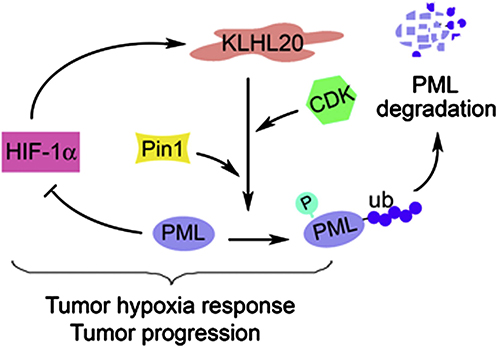
 中央研究院 生物化學研究所
中央研究院 生物化學研究所
Tumor hypoxia is associated with disease progression and treatment failure, but the hypoxia signaling mechanism is not fully understood. Here, we show that KLHL20, a Cullin3 (Cul3) substrate adaptor induced by HIF-1, coordinates with the actions of CDK1/2 and Pin1 to mediate hypoxia-induced PML proteasomal degradation. Furthermore, this PML destruction pathway participates in a feedback mechanism to maximize HIF-1α induction, thereby potentiating multiple tumor hypoxia responses, including metabolic reprogramming, epithelial-mesenchymal transition, migration, tumor growth, angiogenesis, and chemoresistance. In human prostate cancer, overexpression of HIF-1α, KLHL20, and Pin1 correlates with PML down-regulation, and hyperactivation of the PML destruction pathway is associated with disease progression. Our study indicates that the KLHL20-mediated PML degradation and HIF-1α autoregulation play key roles in tumor progression.
論文網站:https://doi.org/10.1016/j.ccr.2011.07.008
作者群:Yuan WC, Lee YR, Huang SF, Lin YM, Chen TY, Chung HC, Tsai CH, Chen HY, Chiang CT, Lai CK, Lu LT, Chen CH, Gu DL, Pu YS, Jou YS, Lu KP, Hsiao PW, Shih HM, Chen RH*
更新時間:2011.08.16
